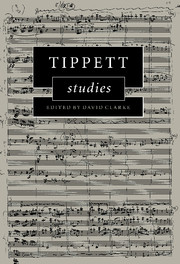Book contents
- Frontmatter
- Contents
- Preface
- References to Tippett's scores and essays
- 1 ‘Only half rebelling’: tonal strategies, folksong and ‘Englishness’ in Tippett's Concerto for Double String Orchestra
- 2 From pastiche to free composition: R. O. Morris, Tippett, and the development of pitch resources in the Fantasia Concertante on a Theme of Corelli
- 3 ‘Is there a choice at all?’ King Priam and motives for analysis
- 4 Tippett's Second Symphony, Stravinsky and the language of neoclassicism: towards a critical framework
- 5 Tippett, sequence and metaphor
- 6 Tonal elements and their significance in Tippett's Sonata No. 3 for Piano
- 7 ‘Significant gestures to the past’: formal processes and visionary moments in Tippett's Triple Concerto
- 8 Tippett's King Priam and ‘the tragic vision’
- 9 Tippett at the millennium: a personal memoir
- 10 Decline or renewal in late Tippett? The Fifth String Quartet in perspective
- Appendix: glossary of terms used in pitch-class set theory
- Index
6 - Tonal elements and their significance in Tippett's Sonata No. 3 for Piano
Published online by Cambridge University Press: 22 September 2009
- Frontmatter
- Contents
- Preface
- References to Tippett's scores and essays
- 1 ‘Only half rebelling’: tonal strategies, folksong and ‘Englishness’ in Tippett's Concerto for Double String Orchestra
- 2 From pastiche to free composition: R. O. Morris, Tippett, and the development of pitch resources in the Fantasia Concertante on a Theme of Corelli
- 3 ‘Is there a choice at all?’ King Priam and motives for analysis
- 4 Tippett's Second Symphony, Stravinsky and the language of neoclassicism: towards a critical framework
- 5 Tippett, sequence and metaphor
- 6 Tonal elements and their significance in Tippett's Sonata No. 3 for Piano
- 7 ‘Significant gestures to the past’: formal processes and visionary moments in Tippett's Triple Concerto
- 8 Tippett's King Priam and ‘the tragic vision’
- 9 Tippett at the millennium: a personal memoir
- 10 Decline or renewal in late Tippett? The Fifth String Quartet in perspective
- Appendix: glossary of terms used in pitch-class set theory
- Index
Summary
I
Enthusiasts of Tippett's piano sonatas might be surprised to read the words ‘tonal’ and ‘significance’ in connection with his Third Piano Sonata (1972–3). If the analytically palliative term ‘elements’ is interposed between these two words then their inclusion in the same sentence might at least enter the realms of plausibility. However, to effect the passage from plausibility to validity will necessitate the surmounting of serious, though by no means conclusive, aesthetic and historical objections.
Paul Crossley, who commissioned the sonata and gave its first performance, has commented that in its last movement, or section, ‘the actual pitches of the notes do not matter’, a remark that is more than a little reminiscent of Harrison Birtwistle's self-assessment, though one that arguably befits his more unambiguously modernist approach to composition. Drawing inspiration from the 130-bar palindrome in the sonata's final movement, Crossley pursues his point further by claiming that ‘it would hardly matter if one turned the score upside down and played it that way’. If there is any validity whatsoever to these judgements then the tonal elements uncovered in the sonata, particularly in the last movement, will have the unusual property of invariance not under the logical operation of inversion, but under the graphical operation of being turned upside down!
Consideration of the sonata's chronological context suggests a more ambivalent attitude to the study of tonal elements.
- Type
- Chapter
- Information
- Tippett Studies , pp. 117 - 144Publisher: Cambridge University PressPrint publication year: 1999
- 1
- Cited by

